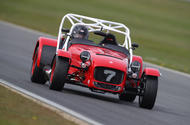Trackday special bridges the gap between 420R and Caterham’s motorsport Seven
So single-minded is any Caterham Seven that every model in the range feels like a would-be racer lacking only an opportunity. But Caterham does offer dedicated racing Sevens, with none more focused than the cage-bedecked, slick-shod, windscreen-less Championship UK Racecar. Ignore the unromantic name: we’ve driven one and adored it for its remarkable ability to be fun and forgiving while feeling grittily raw and millimetre-precise.Alas, it’s solely for the track, which is where the new 420 Cup comes in. Caterham wants you to think of this car as the ultimate road-legal trackday Seven, inspired by the single-seat Championship racer but with solid concessions to comfort and versatility. Inside you’ll duly find Alcantara trim on the transmission-tunnel, and even the optional composite Tillett seats are heated. The roll-cage (of which there are three varities – Track Day, Sport and Race) is also only an opt-in element, though one you may want. This car has the Race cage, which as well as stiffening the body, comes the racer’s metal boot cover, and also acts as plinth for wing mirrors that give the Cup the competition-ready look. Mind you, it also rules out having a windscreen, which the lesser cages don’t. As standard the 420 Cup comes with a trackday roll-bar, which is essentially a cross of metal behind the cockpit.Other racing nods extend to the Schroth harnesses, central petrol-filler and a vented nose-cone seen only on the madcap 620R and the fabulous 420R Donington Edition of 2017. However, where only 10 of the Doningtons were ever made, the 420 Cup will be series production. Note, though, that even with Caterham’s Gatwick showroom recently being converted to a second production facility, the lead time for cars is approaching a year and earliest 420 Cup deliveries will be in 2023.That’s the window-dressing. The true temptation of the 420 Cup is the driveline and suspension. As with the racer, the 620R and the Donington, the Cup comes with Sadev’s punchy (savage?) six-speed sequential ’box, which feeds an LSD in the De Dion rear axle. Power is from the same naturally aspirated, dry-sumped 2.0-litre Duratec engine found in the racer, only with added oomph: 210bhp plays 175bhp. Peaking at 7600rpm, this is the same tune you’ll find in the regular Seven 420, and gives the 560kg Cup fully 375bhp per tonne. The suspension is then controlled with something new for any road-legal Caterham Seven: manually adjustable Bilstein dampers that sit within Eibach springs. These are fairly simple 10-way units with an integrated adjustment for both bump and rebound but they imbue this Seven with proper adaptability.For example, though semi-slick Avon ZZR Extreme tyres are an option, for trackdays you could easily go one step further and slip on some full slicks. Dial the dampers to their firmest setting and hey-presto you’re within touching distance of the Championship racecar experience. Equally, if it’s a damp underwheel, for road-driving you might play it safe with the regular Avon ZZRs and set the dampers to reassuring suppleness.
Source: Autocar
